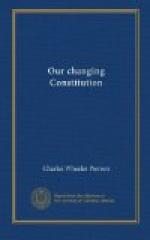The genesis of the act is interesting. The growing demand for more efficient regulation of the corporations, so pronounced during President Roosevelt’s Administration, had foreshadowed such legislation. It remained, however, for President Taft to take the initiative and mould the shape which the legislation was to take.
In the course of the Senate debate on the new Tariff Act it had become apparent that an influential party in Congress, backed by strong sympathy outside, was bent upon passing a general income tax act. The previous Income Tax Law had been pronounced unconstitutional by the Supreme Court as violating the provision of the Constitution that all direct taxes must be apportioned among the states in proportion to population.[1] That decision, however, had been reached by a bare majority of five to four. It had overruled previous decisions and overturned doctrines that had been acquiesced in almost from the foundation of the Government. A strong party was in favor of enacting another income tax law and bringing the question again before the Court in the hope that the Court as then constituted might be induced to overrule or materially modify the doctrine of the Pollock case. The President and his advisers viewed such a proposal with disfavor. To their minds the proper way to establish the right of Congress to levy an income tax was by an amendment to the Constitution, not by an assault upon the Supreme Court. Accordingly on June 16, 1909, the President transmitted a message to Congress[2] recommending a constitutional amendment, and proposing, in order to meet the present need for more revenue, an excise tax on corporations. The proposal, coupled as it was with a suggestion that such an act might be made to serve for purposes of federal supervision and control as well as revenue, met with favor and was enacted into law.
[Footnote 1: Pollock vs. Farmers’ Loan & Trust Co., 157 U.S., 429.]
[Footnote 2: Congressional Record, June 16, 1909, p. 3450.]
President Taft, himself an eminent constitutional lawyer, in his message recommending the law expressed full confidence in its constitutionality. The same view was taken by able lawyers who surrounded him in the capacity of advisers. The act is understood to have been drafted by Mr. Wickersham, the Attorney General, and vouched for by Senator Elihu Root and others of scarcely less authority in the domain of constitutional law.
Against opinions from such sources one takes the field with diffidence. I venture, however, to outline briefly some reasons for doubting the constitutionality of the act.




